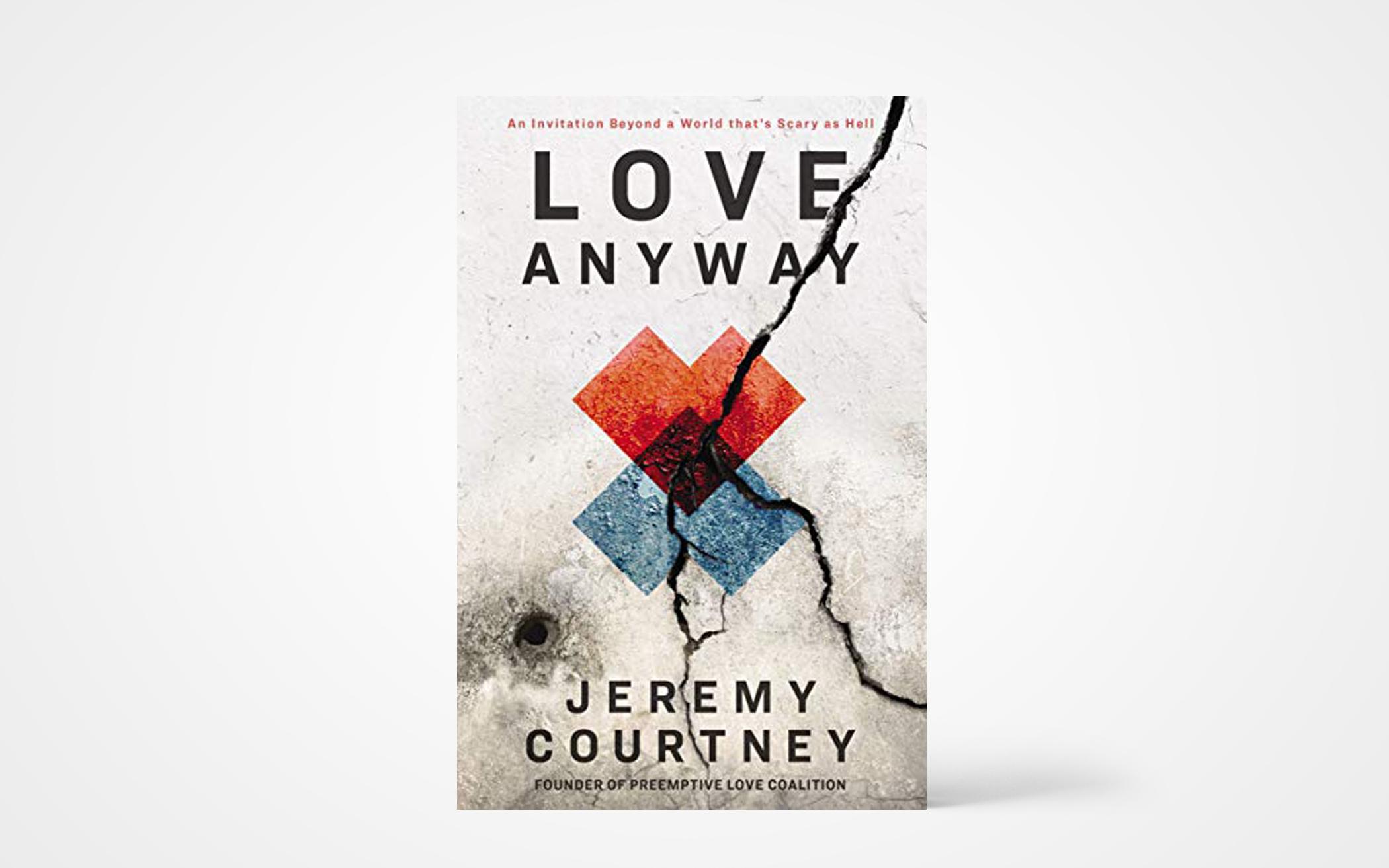As someone who grew up in a Mennonite home, I was taught that peace, not war, was always the solution. That peacemaking was urgently important to God, and that we were to be his agents of spreading peace. I remember a poster in a little Mennonite coffee shop that featured two men hugging. “Let the Christians of the world agree we will not kill each other.” Those peacemaking roots live in me. Recently I commented that God loves our foes in the Middle East, the ones our troops are killing in the name of “protecting our rights and freedoms,” as much as he loves the American, possibly Christian soldiers killing them. It didn’t seem like a particularly controversial statement to me, but the person I said it to was startled, and then said I was right. He had never thought of it that way.
Reading Love Anyway by Preemptive Love Coalition founder Jeremy Courtney brings out many “I never thought of it that way” moments. I realized that “The Way Things Are,” an accepted, mostly unconscious worldview seen through the lens of American exceptionalism, also lives in me, more strongly than I would like to admit.
This agitating, eye-popping book challenges “The Way Things Are” on every page as it tells the story of Courtney’s transformation from status-quo American Christian to radical peacemaker. He brings his wife and young children to Iraq, where they live in a war zone for years. Everyone back home freaks out, including Courtney’s in-laws (I can hardly blame them) and, eventually, the supporting churches who question the family’s sanity and politics.
These supporting churches and individuals did not like what the Courtney’s had to report about life in Iraq—not one little bit. They shut down when Courtney told them about the environmental fallout that U.S. weapons had left in their wake for decades.
“The reports coming out of Fallujah claimed that the rate of congenital heart defects was ten times higher than that was in Europe,” Courtney wrote. “Babies were being born paralyzed. With brain damage. With one eye. And three heads.” This led to countless back alley, coat-hanger abortions as doctors urged Iraqi women not to get pregnant. Of course, this shocking information stood at odds with the preferred narrative of American exceptionalism, and this was not OK. These supporting churches were starting to turn on Courtney and Preemptive Love.
Things came to a head with the election in 2008 of Barack Obama. American churches began to cut off their support for Courtney after he hinted at voting for Obama. He was asked point blank where he stood on abortion; they threatened to withdraw their large financial support of his work in Iraq unless he aligned himself with them politically. “Okay, just so I am clear,’” he writes, “to prove how much you value the lives of children, you’re going to cut off tens of thousands of dollars in support to children in Iraq whose lives you can save?”
This challenged the way they saw the world, to say the least. “The idea that we had valid perspectives they didn’t because we had seen things they’d never seen by climbing places they had never climbed could not be broached,” he writes. “The Way Things Are was paramount.”
Courtney decided to cut ties with these big donors to preserve the integrity of Preemptive Love. He continued to wage peace and to love the people no one else would love—the enemy. He and his family saw the very worst of war. They risked their lives saving lives on the front lines. He came face to face with ISIS, was targeted by death threats, and narrowly escaped airstrikes.
All along, he prioritized a “posture” of preemptive love, of loving anyway, over a position anyone held on a specific issue. This posture was rattled to its core, as was Courtney. War is brutal. But at the end of the book and beyond, he and Preemptive Love are still standing, still waging peace. “Because every war either starts or ends up in somebody’s front yard,” his passion is to cross enemy lines and change the ideas that lead to war. He challenges readers to change their own stubbornly held ideas about rights, freedoms, and exceptionalism. Through many stories—often heartbreaking—he gives a voice to our fellow created humans across the world. And he points us to a new way of thinking about Jesus’ command to love our enemies.
“Our country is the world, our countrymen are all mankind,” Tolstoy said. Reading this book, that statement feels more tangible and real. With its hectic, punchy pace, Love Anyway provokes, shocks, and ultimately gives the reader hope for a more equitable, shalom-infused existence for all our “countrymen” everywhere, even those in “enemy territory.” If the readers open their minds and hearts with a curious posture about a new perspective, this book changes their thinking and challenges them to become “agents of hope who unmake violence and unfurl the more beautiful world our hearts know is possible.” (Zondervan)
About the Author
Lorilee Craker, a native of Winnipeg, Man., lives in Grand Rapids, Mich. The author of 16 books, she is the Mixed Media editor of The Banner. Her latest book is called Eat Like a Heroine: Nourish and Flourish With Bookish Stars From Anne of Green Gables to Zora Neale Hurston.

